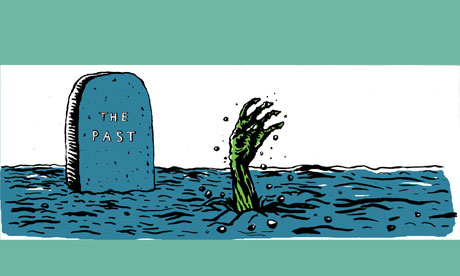The Sense of An Ending

Illustration for the Guardian by Neal Fox, found here. The Guardian has an interesting feature, where they distilled the admittedly short novella into just a few paragraphs, all while pretty much keeping the voice. Don’t read it if you’re going to read the book, obviously.
“Indeed, isn’t the whole business of ascribing responsibility a kind of cop-out? We want to blame an individual so that everyone else is exculpated. Or we blame a historical process as a way of exonerating individuals. Or it’s all anarchic chaos, with the same consequence. It seems to me that there is – was – a chain of individual responsibilities, all of which were necessary, but not so long a chain that everybody can simply blame everyone else. But of course, my desire to ascribe responsibility might be more a reflection of my own cast of mind than a fair analysis of what happened. That’s one of the central problems of history, isn’t it, sir? The question of subjective versus objective interpretation, the fact that we need to know the history of the historian in order to understand the version that is being put in front of us.”
~ Julian Barnes, The Sense of An Ending
Tony Webster is the dubious narrator of The Sense of An Ending, a novella that is as much mystery as novel…though not a traditional whodunit by any means. Instead, it is more a mystery of memory, as Tony describes in detail conversations and events, and then casts doubt in his reliability, with comments about memory and not knowing whether events actually happened as he described them or not.
Tony is a very cautious man, careful in his career, careful in love, careful in life. He is mostly satisfied with this approach, but sometimes we get a glimpse of the admiration he has for those who are more willing and able to go out on a ledge, to try new things…to feel things. Tony is not only careful, he is also remote, a mystery even to himself. He doesn’t even know for sure what kind of woman he is attracted to.
The Sense of An Ending is broken into two parts. The first part serves to shape the narrative, to tell the history of Tony and his small group of friends from school, and how they vowed to stay close in college. He tells of the new boy, who is adopted into their group, Adrian, smarter than the others, more willing to think things through a bit, more willing to take chances and perhaps feel a little something. At one point, Adrian declares in frustration, “I hate the way the English have of not being serious about being serious, I really hate it.” Tony agrees with this sentiment, though Adrian might as well have been describing him. Once in college, Tony has his first serious girlfriend, Veronica. They’re not terribly well suited to each other, and they both find the relationship somewhat frustrating, though he does suit her well enough that she brings him home to meet the family one weekend. The father and brother are somewhat dismissive and jocular, the mother warmer and friendly. When Veronica and Tony inevitably separate, she ends up dating his friend Adrian. Tony wasn’t that sorry that he was no longer with Veronica, but that didn’t mean he wanted his friend dating her, or her dating his friend.
The second part of the book is 40 years in the future. Tony is older now, married and divorced, bald, content if not happy with his life. Until one day he receives an inheritance that confounds him, and makes him look back at his time in college, his time with Veronica, and with Adrian, and wonder if all is what it seemed back then.
I really, really enjoyed this book. It’s a very quick read, entirely possible to finish in one sitting. I liked the twists and turns that the story took, and how the quote I mentioned above, which was Adrian’s reply when his history teacher asked him who started World War I, kept coming to mind and making me wonder how different this tale might seem if there were another narrator.
Thus far, I’m three for three of the books that I decided to read a few weeks ago at the books store. Three really, really good books. Next up is The Dog Stars, which wasn’t on my list, but was waiting for me at the library, and as there is a waiting list for it, I’d best get to it before it’s due. Seems like a good kind of problem to have, no?
One Comment
Gina
Yes, can I trade my problems for yours? 😉